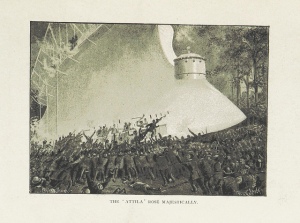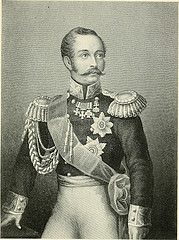This essay compares voluntary law with what has been done or proposed before, pointing out sundry similarities and distinctions. No attempt is made to provide a historical treatise of any kind.
Sometimes people who are newly considering voluntary law will classify it as “just like” something that has existed before. “Oh it is just like the law merchant” some might exclaim. Or, “it is just like” any number of private law institutions, such as Canon Law or Jewish Law, “just like” British common law, Keltic traditions, or various tribal forms, or “just like” some specific past or postulated future form of anarchy. In a way, they are right! Voluntary law grows out of and shares attributes with various legal systems that arose out of voluntary (or partially voluntary) communities. It also resembles at least one contemplated future form of social organization: anarcho-capitalism. But voluntary law should not be confused with these prior institutions or ideas, and is distinctive in its own ways.
There are of course an overwhelming number of historical examples of voluntary communities forming and establishing their own dispute resolution or justice systems. Many of these examples are related to various religious or moral systems. Many others relate to guilds or professions. Still others relate to particular causes, interests or pursuits. Some are purely pragmatic, such as brigands, gangs, and mafias, and do not eschew aggression to serve their ends. Others seek to implement less aggressive forms of social organization, whether for pragmatic, philosophical, or for both purposes. Whatever their nature or purpose, most such voluntary societies have managed to coexist within the dominion of legal systems established by nations or empires; a minority have sought to exclude use of any other legal system; some have sought dominion over others; some were in fact examples of nascent territorial governments. So numerous and well-known are the examples, that it is unnecessary to identify any specifically here.
A useful distinction may be made between an empire, nation, territorial government or tribe, any one of which confers membership by accident of birth or subjugates by conquest, and a voluntary society that requires some intentional action on the part of the member as a precondition of membership, and does not impose membership on any unwilling person. As it relates to the genesis of justice systems within societies, this distinction is not of foremost importance. Nations and various voluntary societies are alike in how their justice systems evolve: first a community forms, and as the community grows and becomes better defined, a justice system is developed; after becoming customary, the system is by diktat or in all practical effect imposed on all the community’s members. Every community member either lives with the justice system, with all its warts and wrinkles, or leaves the community. No individual member of the community is permitted to define her own law. Law making for the community is monopolistic. There is only one authoritative source of law for each community, once the justice system is entrenched.
In contrast, the genesis of justice systems in a voluntary law society is different: first laws are defined; then they are adopted and published by individuals, only then can communities be formed once two or more people have adopted and published compatible laws. The community persists for so long as the two or more people do not revoke their prior adoptions. In other words, a voluntary law society consists by definition of that set of people who have personally adopted compatible laws, regardless of whether or not each of the people have any relationships with each other or even know of one another’s existence. There is no monopoly on law making. Instead, there are as many potential sources of law as there are people in the community. The community does not exist except by adoption of compatible laws. Community coalesces around compatible laws, instead of laws coalescing from authority structures of existing communities. Laws are compatible either by being the same, or being reconcilable by a mutually accepted set of principles, such as TROTWET.
Constitutions, bylaws, and sets of moral (e.g., religious) precepts provide examples of preceding laws, which are sometimes defined prior to organization an associated group. A nation or voluntary association may adopt founding organizational documents before it is deemed to have formed. Such organizational documents set up a structure and process for further rulemaking by some subset of the association that is formed, for example, by its elected officers or by some process that often ultimately depends on electoral majorities. Republics and democracies are examples. Corporations and other collective associations provide other examples. Although constitutional republics and democracies may be preceded by organizational documents, they make territorial and temporal claims of sovereignty that sweep in subjects who never agreed to the original founding documents or to the layers of law added afterwards. Any resemblance to voluntary law is faint indeed. Except for a handful of “founders,” the sovereignty of the state extends to vastly more people than have affirmatively assented to its constitution.
Moreover, while citizens sometime swear to uphold the constitution of a state, such acts do not amount to statements of personal principle, generally speaking. More often than not, the oath is required as a condition for access to some office, agency, or license offered by the state. If the ritual oath is refused, the opportunity that it accompanies is lost. Whether or not one has taken the ritual oaths has no bearing on any person’s fundamental rights or responsibilities under the law of the state to which the oath is sworn. Instead, such oaths are ritual acts that accompany and solemnize the assumption of state office or license. In contrast, under voluntary law the act of public adoption is the primary, if not sole, determinant of the declarant’s legal rights and responsibilities.
Another example of antecedent declaration may be found in corporate founding documents, which come before formation of state-recognized organizations. The founding documents inform members of the structure of the organization, but are also a requirement of an external legal system. For example, a California corporation cannot be defined without adopting a bylaw that is consistent with California law. By organizing under the law of a state, the entity effectively adopts the corporate law of the state it forms in, for resolutions of disputes between its various members. While the association of stakeholders that is centered on corporate entities is normally entirely voluntary, the scope of the bylaws is limited to matters that affect the body as a whole, such as its proper purpose, its manner of government, rights and responsibilities of members, shareholders, or other stakeholders, and other organizational matters. Corporate bylaws are of limited scope, and are deemed binding on the organization as a whole and its offices, instead of being personally applicable. Corporate bylaws provide only a very dim analogy to voluntary law.
Membership organizations with dispute resolution systems provide a closer analogy to voluntary law. Voluntary trading groups like time banks, online auction or trading groups, cooperatives, fraternal organizations, labor unions, churches and other religious congregations, and many other types of voluntary organizations provide some form of dispute resolution rules, often accompanied by a code of conduct. Indeed, depending on their organizational rules, membership groups may blend smoothly into voluntary law and coexist with it, as has been noted above.
Some voluntary associations aspire to provide a full range of legal services for their members. One recent example is BitNation. BitNation is distinctive for its reliance on decentralized blockchain technology to meet the communication needs of its membership. It is also unusual for advertising itself as an alternative to the territorial nation-state. As of this writing, members of BitNation agree to use “British Common Law” to resolve disputes among themselves. It is unclear what this will mean in practice, for example, what forms of British Common Law are acceptable, and what sort of due process is required in different circumstances. It is nonetheless a step in the direction of voluntary law, and may lead to development of technologies that enable formation of truly voluntary law societies in the future. It may itself evolve into implementing voluntary law by at least two pathways. For example, were BitNation to recognize the principle of personal sovereignty and join a consortium of “bit nations” each with its own distinct law and with a sort of “inter-bit-national” law that recognized basic principles of voluntary law and provided conflict of law rules, the consortium and each of its members would be a voluntary law society. In an alternative, BitNation might adopt principles of voluntary law and allow its own members to express and be judged by their own various personal honor codes or laws. Currently, however, BitNation has only one authoritative source of law, albeit vaguely defined.
Previous voluntary membership groups lack any recognition of personal sovereign power to make and adopt one’s own law, without being expelled from the membership society. Uniquely under voluntary law, retaining the benefit of the community does not require that any person be judged by the law of another, so long as a set of rules for resolving conflicts of law are agreed to.
Other distinctions with voluntary law may include the limitation of membership in the group to a set of specially qualified persons. In contrast, membership in voluntary law society is equally available to all persons who possess the philosophical attributes of a person able to make and follow laws. Voluntary law draws the boundaries within which the benefits of community can be enjoyed as broadly as logically possible, and is scalable to a society of practically limitless size. Another distinction may include a limited scope of dispute resolution. For example, Robert’s Rules provides a process for resolving disputes over conduct at a meeting, or malfeasance towards the organization. Few membership organizations enforce rules beyond the scope of the limited purpose of the group. In contrast, because the ultimate sovereignty is personal, voluntary law places no limits or requirements on the law, beyond the three pillars. It can be as comprehensive or as limited as each person desires.
Voluntary law society does not easily or naturally arise from a state of nature. Empirically this is true; voluntary law has never managed to evolve straight from nature and has never been practiced on a large scale. Arguably, it has been practiced in some unspoken ways in families and small communities, to some extent; but it is not remarkable unless and until it can be extended to large societies of strangers. Scaling up will require things like legal registries and reputational networks based on compliance with self-adopted laws. These niceties – such as records of personal laws and neutral reputation networks — cannot easily be developed where every day involves a struggle for survival. Institutions such as reliable record keeping systems and a sense of equality are not “natural”; they have evolved and become more prevalent as the idea of the state has evolved from one resting on the power and property of a monarch, to technological socialist democracies and republics that rest on some theory of public benefit. Although pervasive in their regulation of human affairs and relentless in preservation of their own power, these more modern forms of the state generally acknowledge basic human rights such as freedom of speech and thought, equality of persons, and the right of free association. It is within an established framework of basic rights and a sufficient information infrastructure that institutions of voluntary law, such as publication and adoption of law and reliable reputational records, can take root and grow. Capital surpluses and leisure time that exist in some state-governed territories may also facilitate experimentation with new forms of self-governance. Voluntary law is not so much an enemy of the state as it is an evolved descendant of it, with the potential to replace monopolistic territorial governance, if found useful by adequate numbers of people.
It is sometimes difficult for people to imagine that a generally well-ordered society can exist with diverse and conflicting laws, despite the well-known examples that exist even today. This skepticism is not logically justified. Nations, states, and provinces often enact conflicting laws, and the law to be applied in cases involving people from different jurisdictions, or places subjected to overlapping claims of authority, is not always clear. A well-established branch of law exists for the purpose of sorting out such conflicts of law, and it is not hard to find a lawyer or judge aware of basic principles involved. In the world of territorial governments, conflict of law principles rest firmly on underlying principles of territoriality. There are other systematic ways of resolving legal conflicts without relying on territorial boundaries, however. A large portion of this book is dedicated to explaining one such system, TROTWET. Existing conflict of law systems show that a single unitary set of laws is not a prerequisite for a well-ordered society operating under due process of law.
Many communities are not formally organized, but observe customs and basic principles that preserve basic order and make malfeasance punishable. Such communities might be called “organic anarchies.” There are many documented historical examples of organic anarchies, usually in frontier areas: the sixteenth century Anglo-Scottish borderlands; nineteenth century North American so-called “Wild West;” as well as many tribal areas in Southeast Asia, the Amazon, and Africa, to name a few. In these frontier areas far from the reach of kings, republics and empires that tend to form in richer agricultural areas, legal customs develop organically. In some cases, judges or tribunals develop to resolve disputes according to established custom. These organic anarchies are precursors to a state – not as matter of logical necessity, but as an empirical fact of history. Everywhere (or nearly everywhere) such conditions have prevailed, the dispute resolution processes of the frontier have eventually been assimilated into a state of one kind or another. It may be that such anarchies can persist in remote places indefinitely, and counter-examples of backwards evolution from a state to anarchy may perhaps be found. But even if lawless frontiers re-emerge in areas previously ruled by states, the anarchy will persist for only so long as the conditions that prevent the emergence of a state prevail.
It may be debated whether the social criteria that give rise to the state are mainly psychological, or rest on economic factors. Some say government as we know it is merely mass psychology at work, as argued in The Most Dangerous Superstition by Larkin Rose, or as used to advance the story in the fiction of And Then There Were None by Eric Frank Russell. Others argue that the idea of the state arose out of the rise of capital surpluses, for some fundamentally economic reason. Regardless, the laws and customs of even anarchistic frontier areas are based on territorial boundaries, however loosely defined. If one resides in such areas, one will be subject to the prevailing customs, regardless of one’s views on their morality or sagacity. There is no personal sovereignty over law making, in such societies. Thus, frontier anarchies are also distinct from voluntary law.
Looking more to the present, movements that resemble voluntary law are easier to spot. One such movement is the development of standard copyright licenses by the nonprofit organization “Creative Commons.” People who wish to license their copyrightable content for use without payment of a royalty, subject to certain conditions such as attribution, may do so by referring to one of the standard licenses published by Creative Commons or any competing license, for example a “copyleft” license. Such references to standard licenses resemble an adoption of law under voluntary law. However, there are some differences: a copyleft license is form of contract, and for all present-day copyleft licenses, the underlying law is that of a state. Copyleft provides no stateless alternative for resolution of disputes arising under its licenses.
Voluntary law was inspired by anarcho-capitalism, so it is no surprise that it resembles anarcho-capitalism in many respects. For example, one form of anarcho-capitalism written of by Pete Sisco, “contractual republics,” emphasizes the right of any two people to specify every condition of an agreement between them, including defining a code of law under which the agreement must be interpreted. Essentially, this is freedom of contract as we know it today, but untethered from regulation by a state. Under anarcho-capitalism, without universal respect for the same property rights, there is no legal basis for resolving competing claims. For example, competing claims between hunter-gatherers who do not recognize titled forms of land ownership and farmers who rely on a system of land titles cannot be resolved except by force, with one or the other view prevailing. Accordingly, being generally peaceful people who wish to avoid violent conflict, anarcho-capitalists will argue passionately about the most optimal or best property rights rules to follow. In contrast to anarcho-capitalism, voluntary law rejects any universal notion of property beyond self-sovereignty, instead relying on equality of persons, personal sovereignty, and publication of each person’s personal code of honor as the basis for society. Conflicts are legally resolvable even when the parties do not recognize the same property rights.
Like anarcho-capitalist societies, contractual republics would rely on a universally applied property rights regime. The citizens of each contractual republic, by virtue of holding to the same common agreement, will naturally hold to the same view of property rights. Different contractual republics may recognize different property rights, but there is no legal mechanism for resolving disputes arising out of fundamental disagreements over property rights, or other legal conflicts. Also, contractual republics use a different mechanism for defining laws: agreement of at least two people instead of independent public adoption. Hence, changing one’s law entails a sort of breach of contract in every case. Contractual republics might therefore be somewhat less adaptable in their ability to adjust laws to suit changing conditions and beliefs, than voluntary law societies.
Equivalent results may be realized by contractual republics and voluntary law societies, under some conditions. For example, results may be very similar where at least two conditions are satisfied: first, where everybody holds to the same definitions of property rights; and second, where the system of cooperating contractual republics is sufficiently diverse to provide a life-sustaining republic for every firmly-held minority viewpoint on legal rights and obligations. Where these conditions are met, contractual republics and voluntary law societies may converge on the same outcomes. In every other case, they may be expected to diverge substantially, and every other case might be the norm. It is doubtful whether these two conditions can ever be met, in reality. Much more could be said about differences and similarities between voluntary law and various forms of anarcho-capitalism, but this introduction will not endeavor to say it all.
Voluntary organizations for developing standards, codes and rules are well known in many contexts. Open-source application development groups and technical standards committees provide some examples. It might be said that open-source software developers have blazed a trail for “open-source” voluntary law development. There are many similarities between open-source code development and voluntary law development. In both cases:
• The “code” is open for contribution from anyone who can write useful, reliable code.
• Community leaders review contributions and publish standard versions, but non-standard versions or “forks” are not prohibited.
• Individuals produce and use customized variants and add-ons.
• Community acceptance and network effects determine the adoption rate of any given version, variant, or add-on.
• Community activity creates an eco-system that supports economic transactions around freely distributed codes.
 The very well-tested open-source model is ripe for adaption to development of voluntary laws. The success of the open source movement has proven that code writers can be incentivized to produce complex, useful code for reasons other than direct payment for code-writing services. Thus, there is reason to hope that the voluntary law model may likewise be economically feasible. Besides these similarities, there are some differences to consider. For example:
The very well-tested open-source model is ripe for adaption to development of voluntary laws. The success of the open source movement has proven that code writers can be incentivized to produce complex, useful code for reasons other than direct payment for code-writing services. Thus, there is reason to hope that the voluntary law model may likewise be economically feasible. Besides these similarities, there are some differences to consider. For example:
• Voluntary law development adapts to changes in normative preferences, and less so to changes in technology and aesthetic preferences as in open-source coding.
• There is diminishing incentive for continual development as the law matures, in contrast to technological development that often feeds more technological development.
• Harmonization between legal systems is a critical concern for most legal communities, while software communities are more self-focused.
• Software programming requires special technical knowledge that most people lack, but any thoughtful person can write a law.
• Successful laws must accommodate and bridge disparate normative preferences, unlike computer programs.
• Voluntary laws tend toward simplicity and stability the longer development proceeds, in contrast to software that tends to grow and become more feature-laden.
None of these differences make voluntary law less economically feasible or less likely than open-source software development. On the contrary, the anticipated tendency for voluntarily selected legal codes to stabilize and simplify, and the lack of need for special technical skills, suggests that the long term economic costs of code development for voluntary law will be much less than for open-source code development. Conceivably, well-developed and diverse sets of voluntary laws can be developed for the entire world, and translated into numerous languages, for much less than the combined total of open source projects active today; perhaps even for less than a single large international open-source coding project. The reason it has not happened is because people do not believe that writing and publishing personal codes of honor has any useful value. The thought of everybody picking their own law is too new and too strange of a concept. Very few people have ever considered the possibility, and few that do think it a useful idea. But once voluntary law has been convincingly demonstrated, and its utility is proven, voluntary law can be adopted very rapidly. The economic barriers to widespread adoption are practically nil.
No prior system makes personal sovereignty the basis for law making, assigning all authority and responsibility to the individual. Whatever each person chooses is their own law, to be applied to their own conduct. This is not a boast made on behalf of voluntary law. It is a check on your reading comprehension. At most, prior voluntary associations require voluntary delegation of law making power to some subset of the association, e.g., a majority of members, a committee, a founder, or group of elders. Voluntary law is revolutionary in that aspect of declaring each person sovereign over herself, and only herself. In another aspect, voluntary law is evolutionary and firmly rooted in the past. It freely permits and will make use of rules and methods for dispute resolution and due process of law that have proven useful through the ages, while making use of newer developments such as open-source coding and encrypted public registries such as block chain (Bitcoin) technology. It is new, but not that different.











